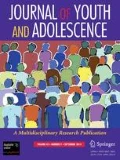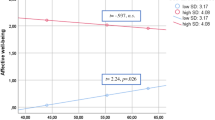Abstract
The research investigates the associations of personal and parental factors with subjective well-being (SWB) in adolescents on the basis of 2 studies. The first included 97 university students and 185 adolescents who completed questionnaires measuring perceived mastery, dispositional optimism, and affect used as a measure of SWB. Correlations and hierarchical regression analyses showed mastery and optimism to be negatively associated with negative affect (NA) and positively associated with positive affect (PA). Demographic variables did not relate to PA and NA except for gender, with female adolescents showing higher levels of NA than males. The second study included 121 adolescents and their parents who completed questionnaires measuring mastery, optimism, SWB indicators, and assessments by the adolescents of their relationships with their parents. The associations of the adolescents' mastery and optimism with SWB measures were positive and were similar to those found in the first study. Positive correlations were found between the adolescents' and their parents' SWB (especially with their father's), but no significant associations were observed between adolescents' and parents' mastery and optimism. However, adolescents' mastery and optimism were related to positive relationships with parents. The results highlight the importance of mastery, optimism, and positive adolescent–parent relationships in contributing to the well-being ofadolescents.
Similar content being viewed by others
REFERENCES
Bandura, A. (1992). Asocial cognitive approach to the exercise of control over AIDS infection. In DiClemente, R. J. (ed.), Adolescents and AIDS: A Generation in Jeopardy. Sage, Newbury Park, CA, pp. 89–116.
Ben-Zur, H. (2002). Coping, affect and aging: The roles of mastery and self-esteem. Pers. Indiv. Differ. 32: 357–372.
Ben-Zur, H., Rappaport, B., Ammar, R., and Uretzky, G. (2000). Coping strategies, life style changes, and pessimism after open-heart surgery. Health Soc. Work 25: 201–209.
Burger, J. (1989). Negative reactions to increases in perceived control. J. Pers. Soc. Psychol. 56: 246–256.
Carvajal, S. C., Clair, S. D., Nash, S. G., and Evans, R. I. (1998). Relating optimism, hope and self-esteem to social influences in deterring substance use in adolescents. J. Soc. Clin. Psychol. 17: 443–465.
Carvajal, S. C., Garner, R. L., and Evans, R. I. (1998). Dispositional optimism as a protective factor in resisting HIV exposure in sexually active inner-city minority adolescents. J. Appl. Soc. Psychol. 28: 2196–2211.
Carver, C. S., Scheier, M., and Weintraub, J. K. (1989). Assessing coping strategies: Atheoretically based approach. J. Pers. Soc. Psychol. 56: 267–283.
Coleman, J. C. (1992). Current views of the adolescent process. In Coleman, J. C. (ed.), The School Years: Current Issues in the Socialization of Young People (2nd edn.). Routledge, London, pp. 1–23.
Crowne, D. P., and Marlowe, D. (1964). The Approval Motive: Studies in Evaluative Dependence. Wiley, New York.
Dalhouse, M., and Frideres, J. S. (1996). Intergenerational congruency: The role of the family in political attitudes of youth. J. Fam. Issues 17: 227–248.
Diener, E., and Emmons, R. A. (1985). The independence of positive and negative affect. J. Pers. Soc. Psychol. 47: 71–75.
Diener, E., and Fujita, F. (1995). Resources, personal strivings, and subjective well-being: A nomothetic and idiographic approach. J. Pers. Soc. Psychol. 68: 926–935.
Field, T., Lang, C., Yando, R., and Bendell, D. (1995). Adolescents' intimacy with parents and friends. Adolescence 30: 133–140.
Fitzgerald, T. E., Tennen, H., Affleck, G., and Pransky, G. S. (1993). The relative importance of dispositional optimism and control appraisals in quality of life after coronary artery bypass surgery. J. Behav. Med. 16: 25–43.
Frydenberg, E. (1997). Adolescent Coping: Theoretical and Research Perspectives. Routledge, London.
Herman-Stahl, M., and Peterson, A. C. (1996). The protective role of coping and social resources for depressive symptoms among young adolescents. J. Youth Adolesc. 25: 733–753.
Hobfoll, S. E., and Walfisch, S. (1984). Coping with a threat to life: A longitudinal study of self-concept, social support, and psychological distress. Am. J. Community Psychol. 12: 87–100.
Holmbeck, G. N., Paikoff, R. L., and Brooks-Gunn, J. (1995). Parenting adolescents. In Bornstein, M. H. (ed.), Handbook of Parenting (Vol. 1). Erlbaum, Mahwah, NJ, pp. 91–118.
Igra, V., and Irwin, C. E. (1996). Theories of adolescent risk-taking behavior. In DiClement, R. J., Hansen, W. B., and Ponton, L. E. (eds.), Handbook of Adolescent Health Behavior Plenum, New York, pp. 35–51.
Keltikangas-Jarvinen, L. (1988). Similarity of Type A behavior in adolescents and their parents. J. Soc. Psychol. 128: 97–104.
Klaczynski, P. A., and Fauth, J. M. (1996). Intellectual ability, rationality, and intuitiveness as predictors of warranted and unwarranted optimism for future life events. J. Youth Adolesc. 25: 755–773.
Larson, R. W., and Richards, M. H. (1994). Family emotions: Do adolescents and their parents experience the same states? J. Res. Adolesc. 4: 567–583.
Lasko, D. S., Field, T. M., Gonzalez, K. P., Harding, J., Yando, R., and Bendell, D. (1996). Adolescent depressed mood and parental unhappiness. Adolescence 31: 49–57.
Lawton, P. (1984). The varieties of well-being. In Malatesta, C. Z., and Izard, C. E. (eds.), Emotion in Adult Development. Sage, London, pp. 67–85.
Lazarus, R. S. (1999). Stress and Emotion: A New Synthesis. Free Association Books, London.
Lazarus, R. S., and Folkman, S. (1984). Stress, Appraisal and Coping. Springer, New York.
Mayseless, O., and Hai, I. (1998). Leaving home transition in Israel: Changes in parent–adolescent relationships and adolescents' adaptation to military service. Int. J. Behav. Dev. 22: 589–609.
Mayseless, O., Wiseman, H., and Hai, I. (1998). Adolescents' relationships with father, mother, and same-gender friend. J. Adolesc. Res. 13: 101–123.
Moos, R. H., and Schaefer, J. A. (1993). Coping resources and processes: Current concepts and measures. In Goldberger, L., and Breznitz, S. (eds.), Handbook of Stress: Theoretical and Clinical Aspects (2nd edn.). The Free Press, New York, pp. 234–257.
Myers, D., and Diener, E. (1995). Who is happy? Psychol. Sci. 6: 10–19.
Neiderhiser, J. M., Reiss, D., and Hetherington, E. M. (1996). Genetically informative designs for distinguishing developmental pathways during adolescence: Responsible and antisocial behavior. Dev. Psychopathol. 8: 779–791.
Paikoff, R. L., and Brooks-Gunn, J. (1991). Do parent–child relationships change during puberty? Psychol. Bull. 110: 47–66.
Paikoff, R. L., Carlton-Ford, S., and Brooks-Gunn, J. (1993). Mother–daughter dyads view the family: Associations between divergent perceptions and daughter well-being. J. Youth Adolesc. 22: 473–492.
Pearlin, L. I., and Schooler, C. (1978). The structure of coping. J. Health Soc. Behav. 19: 2–21.
Pedut, A. (1990). Changes in Self-Concept in Post-Mastectomy Patients Due to Group Occupational Therapy Treatment. M.A. Thesis, University of Haifa (in Hebrew), Haifa, Israel.
Perry, D. G., and Bussey, K. (1984). Social Development. Englewood Cliffs, Prentice-Hall, NJ.
Rustemli, A., and Karamci, A. N. (1996). Distress reactions and earthquake-related cognitions of parents and their adolescent children in a victimized population. J. Soc. Behav. Pers. 11: 767–780.
Scheier, M. F., and Carver, C. S. (1985). Optimism, coping, and health: Assessment and implications of generalized outcome expectancies. Health Psychol. 4: 219–247.
Sim, T. N. (2000). Adolescent psychosocial competence: The importance and role of regard for parents. J. Res. Adolesc. 10: 49–64.
Tellegen, A. (1985). Structures of mood and personality and their relevance to assessing anxiety with an emphasis on self-report. In Tuma, A. H., and Maser, J. D. (eds.), Anxiety and the Anxiety Disorders. Erlbaum, Hillsdale, NJ, pp. 681–706.
Watson, D., and Clark, L. A. (1992). On traits and temperament: General and specific factors of emotional experience and their relation to the five-factor model. J. Pers. 60: 442–476.
Watson, D., Clark, L. A., and Tellegen, A. (1988). Development and validation of brief measures of positive and negative affect: The PANAS scale. J. Pers. Soc. Psychol. 54: 1063–1070.
Zeidner, M., and Ben-Zur, H. (1994). Individual differences in anxiety, coping, and post-traumatic stress in the aftermath of the Persian Gulf War. Pers. Indiv. Differ. 16: 459–476.
Author information
Authors and Affiliations
Rights and permissions
About this article
Cite this article
Ben-Zur, H. Happy Adolescents: The Link Between Subjective Well-Being, Internal Resources, and Parental Factors. Journal of Youth and Adolescence 32, 67–79 (2003). https://doi.org/10.1023/A:1021864432505
Issue Date:
DOI: https://doi.org/10.1023/A:1021864432505




